In recent weeks, and as discontent has been rising throughout the country, tens of thousands of Iraqis have taken to the streets of Baghdad to demonstrate. During the past two years, since Iraq’s declaration of victory against the Islamic State of Iraq and Syria, institutional problems have resulted in large scale protests.
Like in Lebanon, ongoing demonstrations are largely directed at the government. The key issues have been corruption, high unemployment, and the lack of infrastructure. Related issues, such as healthcare, education, and clean drinking water, have also been causes for growing frustration among the general population.
Protests have already become violent with hundreds having died during clashes with security forces and thousands more wounded.
Prime Minister Adel Abdul Mahdi, who only took office in October of last year, is set to resign with his main backers having vowed to remove him.
Mahdi was a compromise candidate between populist Shia Muslim leader Muqtada al-Sadr, who led the Mahdi Army and was a central figure in the insurgency that opposed the U.S. occupation of Iraq, and Hadi al-Amiri. Both have withdrawn their support to the prime minister prompting the president to promise fresh elections.
While al-Sadr and al-Amiri are tentatively working together, they are distinct enough from one another to hamper any coherent and long-term U.S. policy towards Iraq. Despite being a Shi’ite, al-Sadr is largely opposed to Iranian presence in the country–yet he’s equally opposed to US military presence. Al-Amiri, on the other hand, leads an alliance of various Iranian-backed Shia militias. Like his rival he is also averse to the United States.
Additionally, the relocation of U.S. forces from Syria to Iraq has not earned Washington any new friends. Rather, the arrival of these troops has only fuelled anger with Iraqi authorities stating that they came without the country’s approval. U.S. Secretary of Defense Mark Esper has pledged that they are only transiting and will be leaving the country, yet he has failed to provide a specific date.
Though it is difficult to predict the election results, anti-U.S. sentiments are likely to play a prominent role. Any coercive action that the U.S. uses will also likely backfire.
Even without the ongoing political turmoil, it is probable that U.S. influence in the country will continue to slip. This is partially attributable to the consistent lack of long term planning and cooperation between Washington and Baghdad and its largely conflict-oriented focus.
By contrast, Chinese infrastructure investment is seen in the country as being both vital in alleviating Iraq’s short- and long-term problems, as well as presenting an alternative model of international collaboration. This culminated in September, when Iraq formally signed up to Beijing’s Belt and Road Initiative.
Already have an account? Sign In
Two ways to continue to read this article.
Subscribe
$1.99
every 4 weeks
- Unlimited access to all articles
- Support independent journalism
- Ad-free reading experience
Subscribe Now
Recurring Monthly. Cancel Anytime.
In recent weeks, and as discontent has been rising throughout the country, tens of thousands of Iraqis have taken to the streets of Baghdad to demonstrate. During the past two years, since Iraq’s declaration of victory against the Islamic State of Iraq and Syria, institutional problems have resulted in large scale protests.
Like in Lebanon, ongoing demonstrations are largely directed at the government. The key issues have been corruption, high unemployment, and the lack of infrastructure. Related issues, such as healthcare, education, and clean drinking water, have also been causes for growing frustration among the general population.
Protests have already become violent with hundreds having died during clashes with security forces and thousands more wounded.
Prime Minister Adel Abdul Mahdi, who only took office in October of last year, is set to resign with his main backers having vowed to remove him.
Mahdi was a compromise candidate between populist Shia Muslim leader Muqtada al-Sadr, who led the Mahdi Army and was a central figure in the insurgency that opposed the U.S. occupation of Iraq, and Hadi al-Amiri. Both have withdrawn their support to the prime minister prompting the president to promise fresh elections.
While al-Sadr and al-Amiri are tentatively working together, they are distinct enough from one another to hamper any coherent and long-term U.S. policy towards Iraq. Despite being a Shi’ite, al-Sadr is largely opposed to Iranian presence in the country–yet he’s equally opposed to US military presence. Al-Amiri, on the other hand, leads an alliance of various Iranian-backed Shia militias. Like his rival he is also averse to the United States.
Additionally, the relocation of U.S. forces from Syria to Iraq has not earned Washington any new friends. Rather, the arrival of these troops has only fuelled anger with Iraqi authorities stating that they came without the country’s approval. U.S. Secretary of Defense Mark Esper has pledged that they are only transiting and will be leaving the country, yet he has failed to provide a specific date.
Though it is difficult to predict the election results, anti-U.S. sentiments are likely to play a prominent role. Any coercive action that the U.S. uses will also likely backfire.
Even without the ongoing political turmoil, it is probable that U.S. influence in the country will continue to slip. This is partially attributable to the consistent lack of long term planning and cooperation between Washington and Baghdad and its largely conflict-oriented focus.
By contrast, Chinese infrastructure investment is seen in the country as being both vital in alleviating Iraq’s short- and long-term problems, as well as presenting an alternative model of international collaboration. This culminated in September, when Iraq formally signed up to Beijing’s Belt and Road Initiative.










COMMENTS